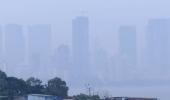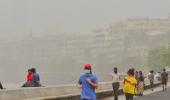Amid a spike in pollution levels in Delhi-NCR, the Supreme Court on Tuesday directed Punjab, Haryana, Uttar Pradesh and Rajasthan to ensure crop residue burning was stopped "forthwith", saying it cannot let "people die" due to pollution.

Questioning the Delhi government's odd-even car rationing scheme, which is aimed at curbing pollution and is scheduled to be enforced in the city from November 13 to 20, the apex court asked about its effectiveness and termed it "all optics".
"I am sorry, this is complete murder of health of people, there is no other phrase I have," said Justice Sanjay Kishan Kaul, who was heading the bench which also comprised Justice Sudhanshu Dhulia.
Another bench of the top court comprising Justices AS Bopanna and MM Sundresh, which was dealing with the firecrackers ban matter, clarified on Tuesday that the top court's order banning firecrackers containing barium binds every state and was not just limited to Delhi-NCR.
The Justice Kaul-led bench also took a stern view of states trying to shift blame to one another for the pollution and observed there cannot be "political battle" all the time.
While hearing a matter pertaining to the debilitating air pollution in the Delhi-National Capital Region (NCR), the bench flagged issues like crop residue burning, vehicular pollution and burning of waste in the open were the major contributors to pollution during this time of the year.
The top court is seized of a plea filed in 1985 by environmentalist M C Mehta on air pollution and the issue of crop residue burning had cropped up during the hearing of the matter.
Expressing concern over widespread stubble burning which were not stopping following paddy harvest, the bench said, "The concern is this... these farm fires are not stopping. What action the states are taking to stop the farm fires?"
"Delhi cannot be made to go through this year after year," it said.
The bench directed the Delhi government to ensure that municipal solid wastes were not burnt in the open in the city.
On the issue of stubble burning, the counsel appearing for Punjab claimed incidents of crop residue burning have come down by 40 per cent since last year.
"We want to stop all this. We don't care how you do it. It is your business how to do it. It must stop," the bench told the counsel, adding, "You have to stop it, whether by forceful action, sometimes by incentives, sometimes by other actions, but you have to stop it."
"We cannot let people die because of this (pollution)," the apex court said, while referring to the health related issues being faced by people due to alarming rise in pollution levels.
It said residents of Delhi have been grappling with health issues at this time of the year, year after year, because a solution to the problem has not been found.
"We direct the state government of Punjab and for that matter, all other states adjacent to Delhi, which is Haryana, Rajasthan and UP -- to ensure that crop burning is stopped forthwith," it said.
The bench made the local station house officer (SHO) concerned, under the overall supervision of the chief secretary, responsible for stopping crop residue burning.
The top court observed it was not saying that crop residue burning was the only contributor to pollution but it was a significant factor during this time of the year.
Senior advocate Aparajita Singh, assisting the court as an amicus curiae in the pollution matter, spoke of recent media reports about non-operational smog towers, which were installed to combat air pollution, in Delhi.
The bench, which asked the chairman of the Delhi Pollution Control Committee (DPCC) to remain present before it on the next date of hearing, said it wanted smog towers to be operationalised and asked the authorities to take immediate steps for it.
It also asked the Delhi government to consider that only taxis registered in the city ply on roads here, saying a large number of taxis registered in other states were seen on road carrying only one passenger.
On the issue of crop residue burning, the counsel appearing for Punjab said the farmers were burning stubble due to economic reasons. The bench observed it was submitted before it that if subsidies were given to farmers for alternative solutions, they may be persuaded to stop crop residue burning.
It noted paddy cultivation was one of the reasons for decline in water table in Punjab and it was suggested during the hearing that it must be phased out and substituted with other crops.
The bench noted it was also suggested that the Centre may consider exploring the possibility of providing minimum support price (MSP) for alternative crops.
The top court said it was argued that paddy grown in adjacent states were illegally brought into Punjab to claim MSP.
It noted that a particular kind of paddy grown in Punjab, of which stubble was a by-product, coupled with the season when it is grown, was one of causes for the problem.
The bench said a serious consideration was required on whether this particular kind of paddy should be grown at all during this period.
"We want all the stakeholders to act promptly in respect of the aforesaid aspects," the court said, suggesting a meeting of all stakeholders should be conducted to discuss these issues.
The bench also referred to the government promoting millets.
The top court said the issue requires immediate attention and court monitoring.
"It has to be sorted out so that it does not happen next year or thereafter," the bench said referring to the surge in pollution.
It also asked the NCR states to apprise it about the implementation of the plan of colour-coded stickers which denote whether a vehicle is run on petrol or diesel.
The bench, which has posted the matter for resumed hearing on Friday, asked the Punjab government to strictly implement the Punjab Preservation of Subsoil Water Act, which aims at preserving groundwater.
Pollution levels in Delhi were recorded in the "very poor" category on Tuesday morning after five consecutive days of severe air quality.
The concentration of PM 2.5, the fine particulate matter capable of penetrating deep into the respiratory system and triggering health problems, exceeded the government-prescribed safe limit of 60 micrograms per cubic metre by seven to eight times in the capital.
It was 30 to 40 times the healthy limit of 15 micrograms per cubic metre set by the World Health Organization (WHO).
Several cities in neighbouring Haryana, Rajasthan, and Uttar Pradesh have also reported hazardous air quality. Ghaziabad recorded an Air Quality Index (AQI) of 338, Gurugram 364, Noida 348, Greater Noida 439 and Faridabad 382.










